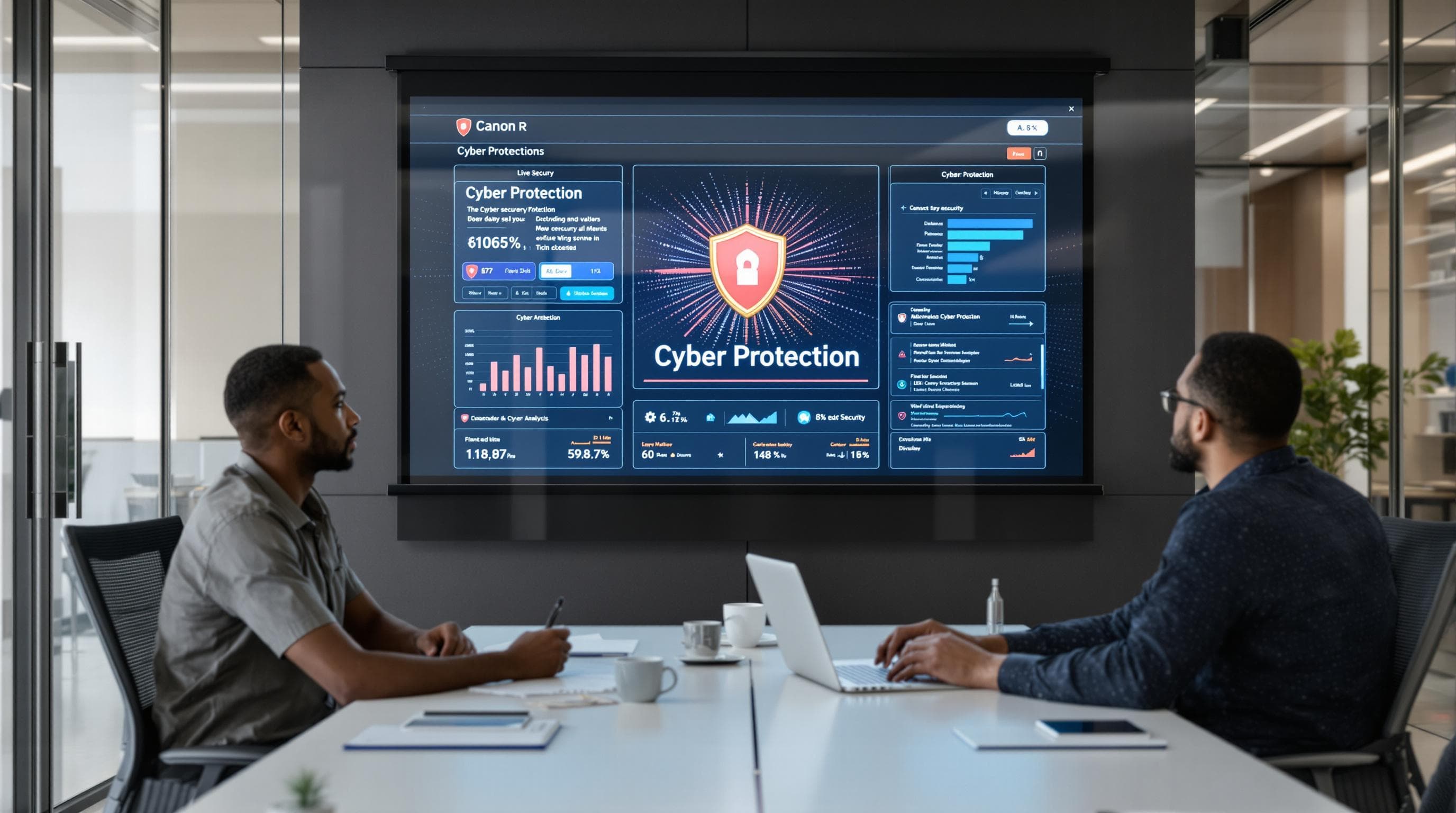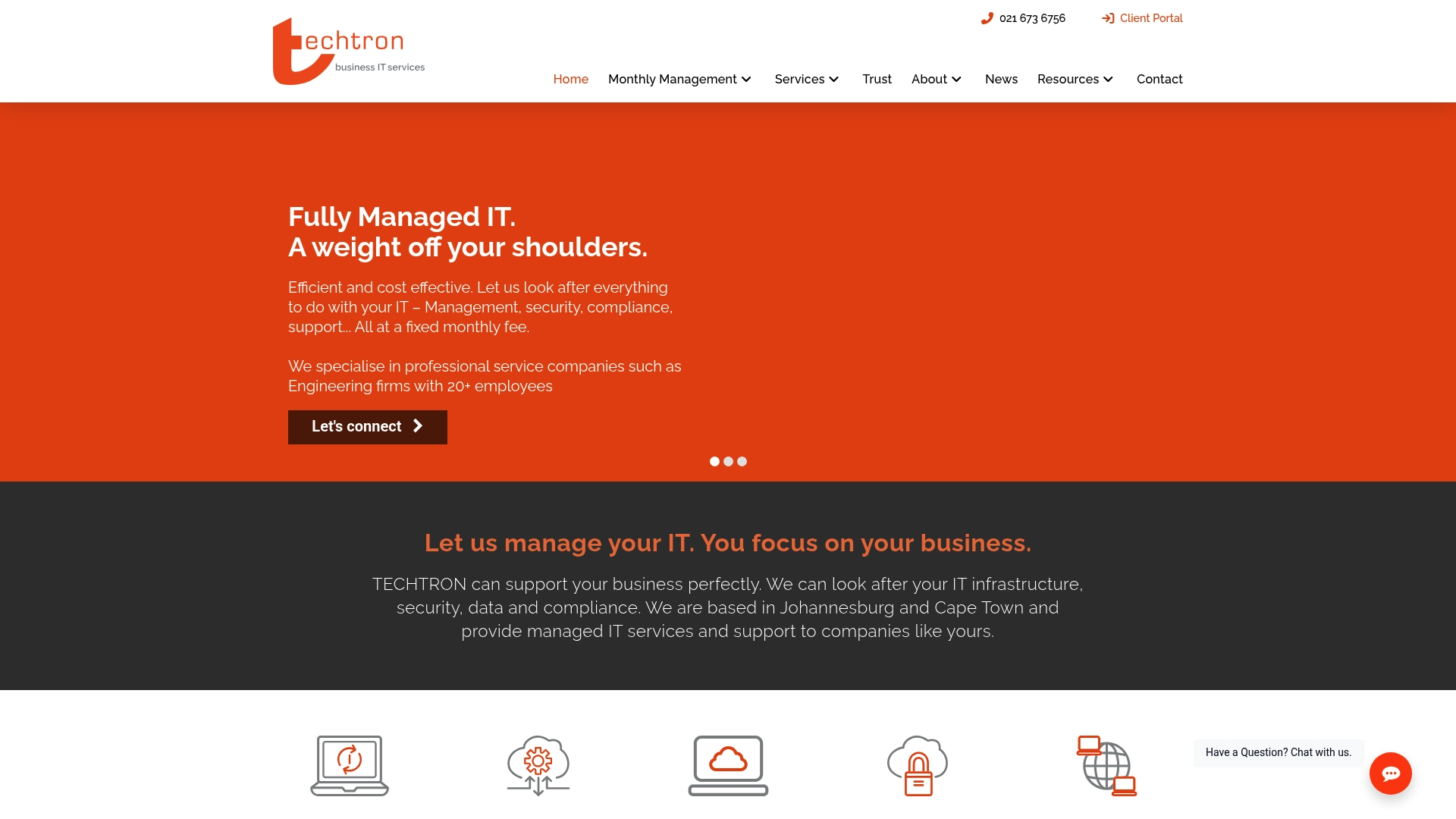IT Infrastructure Management: Strategies for South African Businesses in 2025

IT infrastructure management is on every South African business owner’s radar for 2025. The stakes just keep rising, with AI infrastructure investment in South Africa hitting R5.4 billion. You’d think throwing money at technology would sort out all your IT headaches. Turns out, the real challenge is knowing what to do next, because success now depends on strategies that adapt faster than the tech itself.
Table of Contents
- Understanding IT Infrastructure Management Essentials
- Optimising Security And Data Protection
- Best Practices For Outsourcing IT Management
- Future Trends In IT Infrastructure Management
Quick Summary
| Takeaway | Explanation |
|---|---|
| Comprehensive IT Infrastructure Management | South African businesses must adopt a multifaceted approach to IT infrastructure management that encompasses planning, network management, and proactive strategies to align technology with business objectives. |
| Robust Cybersecurity Strategies | Organizations must implement multi-layered cybersecurity frameworks that include continuous employee training and an adaptive security protocol to manage increasingly sophisticated cyber threats. |
| Strategic Outsourcing Best Practices | When outsourcing IT management, businesses should conduct thorough due diligence on potential partners, establish clear contractual frameworks, and maintain ongoing evaluations to optimize performance and ensure strategic alignment. |
| Emphasis on Future Trends | Companies should anticipate and leverage future trends such as AI-driven management, hybrid cloud infrastructure, and sustainable practices to create resilient and adaptable technological environments. |
| Continuous Learning and Adaptation | Successful IT infrastructure management is a dynamic process requiring a commitment to continuous learning and adaptation to keep pace with technological advancements and changing business needs. |
Understanding IT Infrastructure Management Essentials
IT infrastructure management represents the comprehensive approach businesses use to oversee, maintain, and optimize their technological ecosystems. At its core, this strategic process involves coordinating hardware, software, networks, servers, and digital systems to ensure operational efficiency and technological resilience.
Core Components of IT Infrastructure Management
Successful IT infrastructure management requires a multifaceted approach that integrates technical expertise with strategic planning. Learn more about our comprehensive IT management strategies that address the unique challenges faced by South African businesses.
The fundamental components encompass several critical domains. Infrastructure planning involves designing technological architectures that align with business objectives. This includes evaluating current systems, anticipating future technological needs, and creating scalable solutions that can adapt to evolving business requirements. According to the Eastern and Southern African Management Institute, effective ICT infrastructure management demands a structured understanding of service management principles and lifecycle concepts.
Network management represents another crucial element, focusing on maintaining connectivity, performance, and security across digital platforms. This involves monitoring network traffic, managing bandwidth, implementing robust security protocols, and ensuring seamless communication between different technological components. Research from the South African Journal of Information Management highlights that adopting Infrastructure as a Service (IaaS) can significantly enhance scalability and operational flexibility for organizations.
Below is a summary table outlining the core components of IT infrastructure management and their primary focus for South African businesses.
| Component | Primary Focus |
|---|---|
| Infrastructure Planning | Aligning technology architectures with business objectives |
| Network Management | Ensuring connectivity, performance, and digital platform security |
| System Monitoring | Tracking system health, bandwidth, and overall performance |
| Security Protocols | Implementing protective measures for data and network safety |
| Scalability Solutions | Designing scalable, adaptable systems for future business needs |
Strategic Implementation and Challenges
Implementing effective IT infrastructure management requires a proactive and holistic approach. Businesses must develop comprehensive strategies that address technological integration, security risks, and performance optimization. This involves continuous assessment of existing systems, identifying potential vulnerabilities, and implementing adaptive solutions that can respond to emerging technological trends.
Key challenges include managing increasingly complex technological ecosystems, addressing cybersecurity threats, and balancing technological investments with budgetary constraints. South African businesses must navigate these challenges by developing agile infrastructure management frameworks that prioritize both technological innovation and operational stability.
Modern IT infrastructure management goes beyond traditional technical maintenance. It demands a strategic vision that aligns technological capabilities with broader business objectives. By developing robust infrastructure management strategies, organizations can create more resilient, efficient, and adaptable technological environments that support sustainable growth and competitive advantage.
Successful implementation requires continuous learning, strategic investment, and a commitment to technological excellence. Businesses that approach IT infrastructure management as a dynamic, evolving discipline will be better positioned to leverage technological innovations and drive organizational success.
Optimising Security and Data Protection
In the rapidly evolving digital ecosystem, security and data protection have become paramount for South African businesses seeking to safeguard their technological assets and maintain operational integrity. The increasing sophistication of cyber threats demands a proactive and comprehensive approach to protecting organizational infrastructure.
Comprehensive Cybersecurity Strategies
Developing robust cybersecurity strategies requires a multi-layered approach that addresses potential vulnerabilities across technological platforms. Explore our emerging security technologies to understand cutting-edge protective measures. Organizations must implement comprehensive security frameworks that encompass technological solutions, human awareness, and regulatory compliance.
According to the University of Johannesburg’s cybersecurity initiative, addressing the critical cybersecurity skills gap is essential. This involves continuous training, skill development, and creating a culture of security awareness within organizations. Businesses must invest in ongoing education programs that equip employees with the knowledge to recognize and mitigate potential security risks.

The South African State Security Agency’s draft Cybersecurity Strategy emphasizes the importance of building national resilience against cyber threats. This approach requires businesses to develop adaptive security protocols that can respond dynamically to emerging technological challenges.
Regulatory Compliance and Data Protection
Navigating the complex landscape of data protection regulations presents a significant challenge for South African businesses. The Protection of Personal Information Act (POPIA) mandates stringent requirements for managing and protecting personal data. Learn more about effective staff training for POPIA compliance to ensure your organization meets legal standards.
The Gauteng Department of e-Government has highlighted the critical importance of investing in cybersecurity initiatives. This involves implementing advanced security technologies, conducting regular risk assessments, and developing comprehensive incident response plans.
Key strategies for optimizing security and data protection include:
- Advanced Threat Detection: Implementing sophisticated monitoring systems that can identify and respond to potential security breaches in real-time.
- Zero Trust Architecture: Adopting security models that verify every access request, regardless of its origin.
- Regular Security Audits: Conducting comprehensive assessments to identify and address potential vulnerabilities.
Successful security and data protection strategies require a holistic approach that combines technological solutions, human expertise, and continuous adaptation. Businesses must view security not as a one-time implementation but as an ongoing process of protection, education, and improvement.
As cyber threats continue to evolve, organizations must remain vigilant and proactive. This means investing in cutting-edge security technologies, fostering a culture of security awareness, and maintaining a flexible approach to protecting digital assets. By prioritizing comprehensive security strategies, South African businesses can create resilient technological environments that protect their most valuable resources.
Best Practices for Outsourcing IT Management
Outsourcing IT management has become a strategic approach for South African businesses seeking to optimize technological capabilities while managing operational costs. This complex process requires careful planning, strategic alignment, and a comprehensive understanding of potential benefits and challenges.
Strategic Selection and Due Diligence
Choosing the right IT management partner demands rigorous evaluation and strategic consideration. Learn more about selecting the right service approach to ensure optimal technological support. According to BPeSA, organizations must conduct thorough due diligence on potential service providers, focusing specifically on their compliance with data protection regulations and ability to meet service-level agreements.
Key considerations in the selection process include:
- Technical Expertise: Evaluating the provider’s technological capabilities and industry-specific experience
- Compliance Standards: Ensuring alignment with local and international regulatory requirements
- Security Protocols: Assessing the provider’s cybersecurity infrastructure and data protection mechanisms
The table below summarizes key considerations when selecting an IT management outsourcing partner.
| Consideration | Description |
|---|---|
| Technical Expertise | Assess provider’s technological abilities and industry experience |
| Compliance Standards | Ensure compliance with SA and international regulations |
| Security Protocols | Evaluate cybersecurity measures and data protection |
Contractual Framework and Performance Management
Small and Medium Enterprise South Africa emphasizes the critical importance of establishing clear contractual frameworks. Effective IT management outsourcing requires comprehensive agreements that explicitly outline:
- Specific service responsibilities
- Performance metrics and key performance indicators
- Data security and confidentiality provisions
- Incident response and resolution protocols
- Dispute resolution mechanisms
The Bizcommunity IT Outsourcing Report highlights the necessity of aligning outsourcing strategies with broader organizational objectives. This means moving beyond cost considerations to focus on strategic value creation, technological innovation, and operational efficiency.
Continuous Evaluation and Collaborative Partnership
Successful IT management outsourcing is not a static arrangement but a dynamic, collaborative relationship. Businesses must implement robust monitoring mechanisms to continuously assess the performance and strategic alignment of their outsourcing partnerships.
This involves:
- Regular performance reviews
- Transparent communication channels
- Flexible adaptation to technological changes
- Ongoing skills transfer and knowledge sharing
Effective outsourcing transforms external IT management from a transactional service to a strategic partnership. By adopting a holistic approach that balances technical expertise, contractual clarity, and collaborative engagement, South African businesses can leverage outsourced IT management as a powerful tool for technological innovation and competitive advantage.
Ultimately, the success of IT management outsourcing hinges on selecting partners who not only provide technical solutions but also understand and support the unique strategic objectives of your organization. Businesses must view these relationships as long-term strategic investments that contribute to overall technological resilience and operational excellence.
Future Trends in IT Infrastructure Management
The landscape of IT infrastructure management is rapidly transforming, driven by technological innovations, evolving business needs, and emerging digital challenges. South African businesses must anticipate and adapt to these dynamic shifts to maintain competitive advantage and operational resilience.
Artificial Intelligence and Automation
Explore emerging technologies that are reshaping IT infrastructure and understand their potential impact. According to Microsoft South Africa, the country is positioning itself as a continental AI hub with a substantial R5.4 billion investment in artificial intelligence infrastructure. This significant commitment signals a transformative approach to technological integration.
Artificial intelligence is revolutionizing IT infrastructure management through advanced predictive maintenance, intelligent resource allocation, and autonomous problem resolution. Machine learning algorithms can now anticipate system failures, optimize network performance, and provide real-time insights into technological ecosystems. These capabilities enable businesses to shift from reactive to proactive infrastructure management strategies.
Key AI-driven infrastructure management capabilities include:
- Predictive Maintenance: Identifying potential system failures before they occur
- Intelligent Resource Optimization: Dynamically allocating computational resources
- Automated Security Monitoring: Detecting and responding to potential cybersecurity threats in real-time
Cloud and Hybrid Infrastructure Strategies
The South African government’s National Data and Cloud Policy underscores the growing importance of cloud services. Businesses are increasingly adopting hybrid infrastructure models that combine on-premises systems with cloud-based solutions, offering unprecedented flexibility and scalability.
The Gauteng Department of e-Government’s 4IR Growth and Digitalisation Strategy exemplifies this trend, focusing on upgrading digital platforms and expanding e-services. This approach demonstrates how infrastructure management is evolving from traditional hardware-centric models to more dynamic, software-defined environments.
Sustainable and Resilient Infrastructure
Future IT infrastructure management will prioritize sustainability, energy efficiency, and environmental responsibility. Businesses are developing green computing strategies that reduce carbon footprints while maintaining high-performance technological capabilities. This involves:
- Implementing energy-efficient hardware
- Utilizing renewable energy sources for data centers
- Designing infrastructure with circular economy principles
Resilience has become a critical consideration, with infrastructure designs emphasizing redundancy, distributed systems, and rapid recovery mechanisms. Organizations are developing infrastructure architectures that can withstand potential disruptions, whether from technological failures, cyber incidents, or external environmental challenges.
The future of IT infrastructure management demands a holistic approach that integrates technological innovation, strategic foresight, and adaptable design principles. South African businesses must view infrastructure not as a static technological asset but as a dynamic, evolving ecosystem that supports organizational growth and innovation.
Successful organizations will be those that embrace continuous learning, remain agile in their technological strategies, and view infrastructure management as a strategic driver of business transformation. By anticipating and proactively responding to emerging trends, businesses can create robust, intelligent, and responsive technological environments that deliver sustainable competitive advantages.
Frequently Asked Questions
What is IT infrastructure management?
IT infrastructure management refers to the comprehensive approach businesses use to oversee, maintain, and optimize their technological ecosystems, including hardware, software, networks, and servers.
Why is cybersecurity important in IT infrastructure management?
Cybersecurity is crucial because it protects organizations from increasingly sophisticated cyber threats that can compromise their operational integrity and data security, ensuring that their systems remain resilient and secure.
What are the best practices for outsourcing IT management?
Best practices for outsourcing IT management include conducting thorough due diligence on potential partners, establishing clear contractual frameworks, and maintaining ongoing evaluations to optimize performance and foster collaborative partnerships.
How can South African businesses prepare for future trends in IT infrastructure management?
South African businesses can prepare by leveraging AI-driven management, adopting hybrid cloud strategies, and prioritizing sustainability in their tech infrastructure to remain competitive and resilient in evolving market conditions.
Transform Your IT Challenges Into Seamless Success With Techtron
Are you worried about keeping your business secure, compliant, and efficient in a technology landscape that never stands still? This article highlights just how complex IT infrastructure management has become in South Africa, especially for firms facing advanced cyber threats, regulatory pressures, and the move to intelligent automation. For professional and growing organisations, these challenges can turn into serious risks overnight.

Take back control and remove the uncertainty. At Techtron, we specialise in managed IT solutions for ambitious businesses just like yours. Our enterprise-grade support takes care of everything from cybersecurity and network management to secure cloud integration, letting you focus on growing your business rather than fighting IT fires. Explore how our service agreements proactively reduce risks, boost productivity, and prepare you for every challenge 2025 will bring. Contact us today and experience the peace of mind your business deserves.